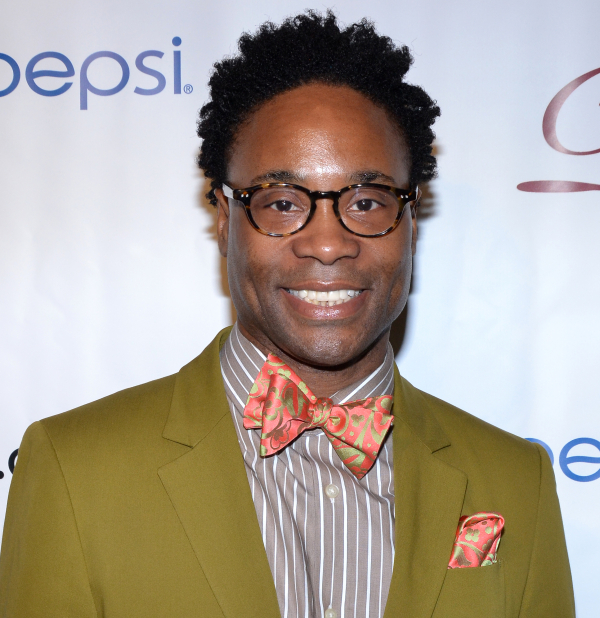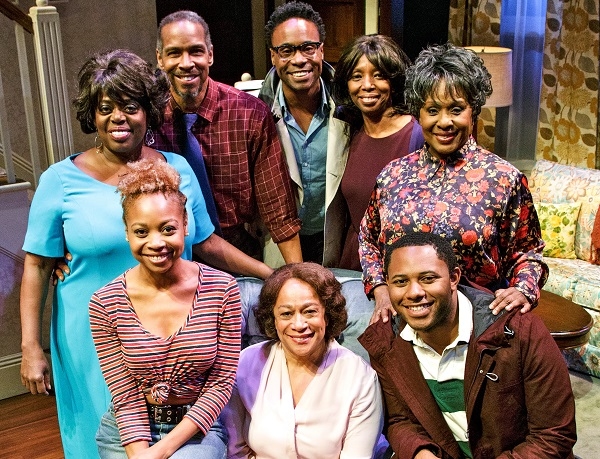From Performer to Playwright: The Many Hats of Billy Porter
The Tony winner kicks off his ”Kinky Boots” to talk about his new role as playwright with ”While I Yet Live” at Primary Stages.

(© David Gordon)
Tony Award winner Billy Porter is taking on the new role of playwright as he opens While I Yet Live at Primary Stages. Though the play is fictional, it is largely based on Porter’s childhood in Pittsburgh and the determined women who raised him. The play, which stars S. Epatha Merkerson and Lillias White, touches on Porter’s experience growing up black, Christian, gay, and abused. The singer, composer, director, playwright, and actor has been busy juggling many hats. Since originating the role of Lola in Kinky Boots in 2013, Porter has also finished writing his aforementioned play, lent his talents to the feature film The Humbling opposite Al Pacino, and saw the release of his first album, Billy’s Back on Broadway. On the eve of his 45th birthday, Porter spoke with TheaterMania about bringing his own inspiring story to the New York stage, devising the spec script of Will & Grace that he secretly authored, and presenting While I Yet Live as a love letter to his family.
What was the most challenging aspect of switching hats from performer to playwright when you began working on While I Yet Live?
As a performer I never had any doubt about my talent and what I could do. I had doubt, but it was never about what I could bring into the room. My art was always the one thing where I was secure and solid, and it would keep me courageous for other areas of my life.
When I started writing it was the first time I experienced that doubt in relation to my art. I also found that it’s easier to take on somebody else’s stuff and perform it because if people don’t like it, it doesn’t fall on your shoulders. But if people don’t like While I Yet Live, they don’t like me, especially because it’s so autobiographical.
What has been the most gratifying moment in seeing it in its entirety?
The most gratifying moment is to see that there’s actually something for the actors to interpret, when the intention behind what I wrote comes to the fore with actors who are working on the material without me in the room. It means that my intention is on the page.
What was the first material that you ever remember writing?
It was a [spec] episode of Will & Grace (which I only eventually showed to Megan Mullally). I had been really disenchanted with the business, I wasn’t working, and I wasn’t happy with what was available to me. I was talking to a producer friend who was telling me how special I am. I was like, "Well, I don’t know what that means because I’m unemployed and I don’t have any money and I can’t make a living, but you’re telling me that I’m special." He suggested that I write. The initial idea of writing came out of that frustration. Over the years it has deepened and morphed into a true craft and love.
The play is about strong women, and it’s directed by a woman (Sheryl Kaller). What do you think While I Yet Live says about strong women?
What I hope it says for women in general is that we need to hear their stories. Women are the backbone of our community. If women were running sh*t, we wouldn’t be in such a kerfuffle in this world. That’s what I’m trying to say. Let them do it! Men are useless! [laughs]
What is the meaning behind the title While I Yet Live?
It’s an old hymn by James Cleveland, one of the godfathers of contemporary gospel music back in the late sixties and early seventies. He wrote a song called "Give Me My Flowers" in which the chorus goes, "Give me my flowers while I yet live so that I can see the beauty that they bring." It means, Tell me you love me while I’m alive, apologize while I’m alive, do all the things that you need to do while I’m here on earth so that you don’t have to have any regrets. That’s what the play is about.
What would be the most rewarding response to While I Yet Live from your family?
I’ve already received it. The response by my family is what ignited me to write the play…it’s a love letter to my mother, my sister, and the women who raised me. It was ignited by this transformation that my mother made in relation to our relationship and what it was that we went through…it was their unadulterated, unconditional love and acceptance.

(© James Leynse)








